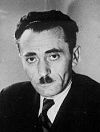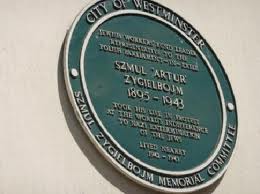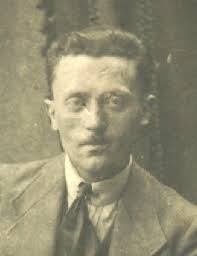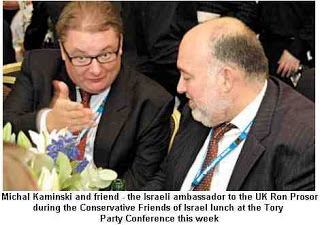70 Years Ago the Representative of Polish Jewry Committed Suicide in Protest at the world’ indifference to the Holocaust as the Zionist Leaders Made the Creation of Israel the Priority
 |
| Shmuel Zyglebojm |
Today the holocaust is on the lips of every reactionary buffoon. European far-Right politicians pay homage to Yad Vashem by day and then join the Waffen SS ‘veterans’ by night. But at the time the world Zionist leaders kept quiet. No Madison Square demonstrations or pickets or Hollywood glitz. Then all eyes were on building the Aryan (Zionist) state.
Shmuel Zygielbojm was one of 2 elected Jewish leaders in the Polish government-in-exile. The other one, a Zionist, Ignacy Schwarzbart, who proved worse than useless and like his comrades said nothing publicly about the holocaust. Quiet whispers in the Establishment’s ears about that which they already knew.
In the last Jewish Council seats in 1938 the Bund (anti-Zionist) obtained 17/20 seats. The Zionists precisely one. A pattern repeated all over Poland. As the holocaust approached Zionism proved its uselessness in its belief that anti-Semitism couldn’t be fought. It was as a final gesture that this hero to Jewish people took his life as the Zionists sought to keep silent and silence ot hers.
Tony Greenstein
Seventy years ago, as the Warsaw Ghetto was crushed, Szmul Zygielbojm suicide in London was not a futile gesture.
Posted: 17 May 2013 05:30 PM PDT
Cross-post from
Seventy years ago, the Warsaw Ghetto uprising was crushed. In London, Szmul Zygielbojm took his own life in protest. He was a Polish Jew, a socialist and the representative of the Bund (the Jewish workers’ party) in the Polish government in exile.
He left behind a letter in which he explained his action:
“The latest news that has reached us from Poland makes it clear beyond any doubt that the Germans are now murdering the last remnants of the Jews in Poland with unbridled cruelty. Behind the walls of the ghetto the last act of this tragedy is now being played out.
The responsibility for the crime of the murder of the whole Jewish nationality in Poland rests first of all on those who are carrying it out, but indirectly it falls also upon the whole of humanity, on the peoples of the Allied nations and on their governments, who up to this day have not taken any real steps to halt this crime. By looking on passively upon this murder of defenceless millions – tortured children, women and men – they have become partners to the responsibility.
… I cannot continue to live and to be silent while the remnants of Polish Jewry, whose representative I am, are being murdered. My comrades in the Warsaw ghetto fell with arms in their hands in the last heroic battle. I was not permitted to fall like them, together with them, but I belong with them, in their mass grave.
By my death, I wish to make the strongest possible protest against the passivity with which the world is looking on and permitting the extermination of the Jewish people. I know how little life is worth today, but since I was unable to do anything during my life, perhaps by my death I shall help to break down the indifference of those who have the possibility even now, at the last moment, to save the handful of Polish Jews who are still alive from certain annihilation.
… My life belongs to the Jewish people of Poland, and therefore I hand it over to them now. I yearn that the remnant that has remained of the millions of Polish Jews may live to see liberation together with the Polish masses, and that it shall be permitted to breathe freely in Poland and in a world of freedom and socialistic justice, in compensation for the inhuman suffering and torture inflicted on them. And I believe that such a Poland will arise and such a world will come about…”
Shmuel Zygielbojm
{ 2 comments}
George Jochnowitz May 11, 2011 at 10:51 pm
Laurel Leff, in her book BURIED BY THE TIMES, reports that the the full text of Zygielbojm’s letter appeared in a news story in the Times–on page seven.
Bob Cartwright May 12, 2011 at 12:15 am
Jan Karski had recently brought specific news of the holocaust to Britain and later America. He had met with the leader of the Bund in Warsaw, Leon Feiner. Feiner told Karski “Tell the Jewish leaders, that … they must find the strength and courage to make sacrifices no other statesmen have ever had to make, sacrifices as painful as the fate of my dying people, and as unique.”
Newspaper accounts based on Karski’s reports were published by The New York Times on November 25 and November 26 and The Times of London on December 7.
In December, Karski described the conditions in the ghetto to Zygielbojm. Zygielbojm asked whether Karski had any messages from the Jews in the ghetto. As Karski later wrote, he passed along Feiner’s message:
This is what they want from their leaders in the free countries of the world, this is what they told me to say: “Let them go to all the important English and American offices and agencies. Tell them not to leave until they obtain guarantees that a way has been decided upon to save the Jews. Let them accept no food or drink, let them die a slow death while the world is looking on. Let them die. This may shake the conscience of the world.”
Two weeks later, Zygielbojm spoke again on BBC Radio concerning the fate of the Jews of Poland. “It will actually be a shame to go on living,” he said, “if steps are not taken to halt the greatest crime in human history.”
On April 19, 1943, the Allied governments of the United Kingdom and the United States met in Bermuda, ostensibly to discuss the situation of the Jews in Nazi-occupied Europe. By coincidence, that same day the Nazis attempted to liquidate the remaining Jews in the Warsaw Ghetto and were met with unexpected resistance.
By the beginning of May, the futility of the Bermuda Conference had become apparent. Days later, Zygielbojm received word of the suppression of the Warsaw Ghetto Uprising and the final liquidation of the Warsaw Ghetto. Zygielbojm then killed himself as a protest against the indifference and inaction of the Allied governments in the face of the Holocaust.
In his “suicide letter,” addressed to Polish president Władysław Raczkiewicz and prime minister Władysław Sikorski, Zygielbojm stated that while the Nazis were responsible for the murder of the Polish Jews, the Allies also were culpable:
The responsibility for the crime of the murder of the whole Jewish nationality in Poland rests first of all on those who are carrying it out, but indirectly it falls also upon the whole of humanity, on the peoples of the Allied nations and on their governments, who up to this day have not taken any real steps to halt this crime. By looking on passively upon this murder of defenseless millions tortured children, women and men they have become partners to the responsibility.
I am obliged to state that although the Polish Government contributed largely to the arousing of public opinion in the world, it still did not do enough. It did not do anything that was not routine, that might have been appropriate to the dimensions of the tragedy taking place in Poland….
I cannot continue to live and to be silent while the remnants of Polish Jewry, whose representative I am, are being murdered. My comrades in the Warsaw ghetto fell with arms in their hands in the last heroic battle. I was not permitted to fall like them, together with them, but I belong with them, to their mass grave.
By my death, I wish to give expression to my most profound protest against the inaction in which the world watches and permits the destruction of the Jewish people.
Zygielbojm’s suicide was a deeply reasoned and socially responsible act. But according to the values prevailing in our own society, it should be dismissed or even condemned as a “futile gesture”, a “pointless sacrifice” – and therefore something pathological, neurotic, “self-indulgent”. All my political life I have heard this said about any sacrifice made for a just cause. It was said in the 80s about the miners who tried and failed to save their communities, and about the councillors who stood up for local democracy against rate capping and got surcharged and chucked out of politics for their pains. It’s being said now about Palestinian hunger strikers. It has been the stock-in-trade of Third Way, post-social democratic politics, where to sacrifice one’s political career or “viability” by standing up against power and prejudice is viewed as a self-evidently self-defeating folly. Surely it is this ideology of self-serving “pragmatism” that ought to be dubbed “self-indulgent”? What’s truly pathological and neurotic is the “common sense” of egocentric individualism, the obsession with personal success and status, the desperation to conform to an inhuman, destructive social order.
Mike Marqusee (with amendments to letter)
May 2013


